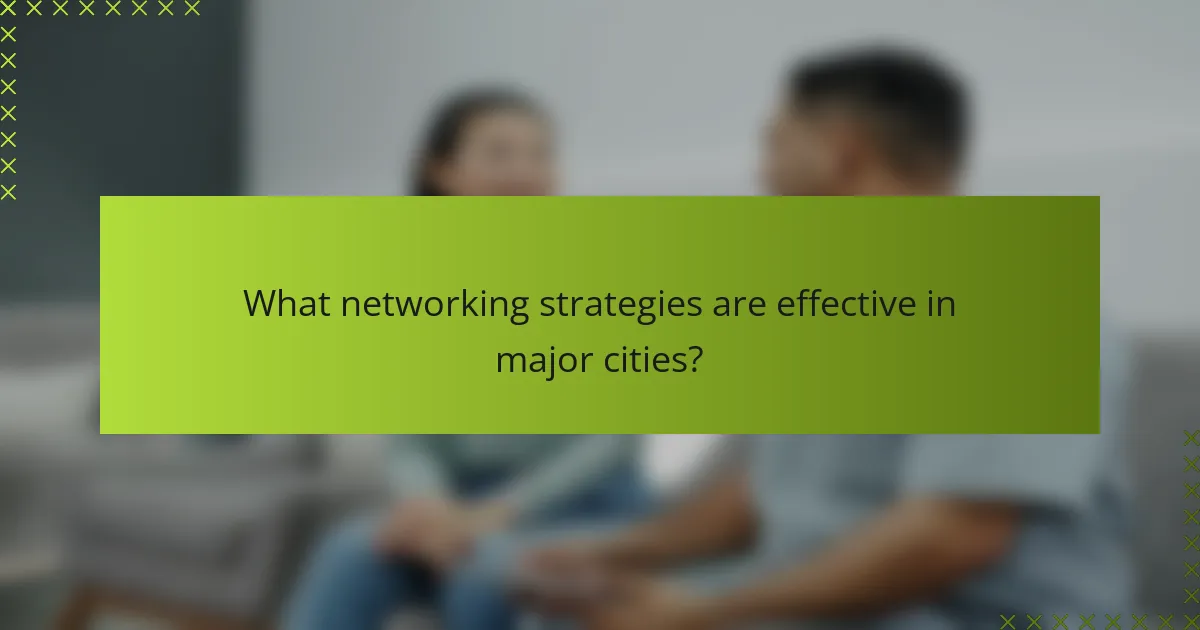Networking opportunities are essential for career advancement and personal growth, offering access to valuable insights and potential collaborations. By engaging with professionals in your field, you can build meaningful relationships that open doors to new opportunities and foster a supportive network for your development.

What are the benefits of networking opportunities?
Networking opportunities provide significant advantages, including career advancement, access to valuable insights, and the potential for collaboration. Engaging with professionals in your field can lead to personal growth and open doors to new possibilities.
Enhanced career growth
Networking can significantly enhance your career growth by connecting you with key industry players and decision-makers. Building a diverse network allows you to learn about job openings, promotions, and career paths that may not be publicly advertised.
Consider attending industry conferences or local meetups to expand your connections. Actively participating in these events can lead to referrals and recommendations that may accelerate your career trajectory.
Access to industry insights
Networking provides access to valuable industry insights that can inform your decisions and strategies. By engaging with peers, you can learn about emerging trends, best practices, and potential challenges within your field.
Participating in discussions, forums, or online groups can help you stay updated on the latest developments. This knowledge can give you a competitive edge and enhance your professional expertise.
Increased collaboration potential
Networking fosters increased collaboration potential by connecting you with individuals who share similar interests and goals. Collaborative projects can lead to innovative solutions and shared success.
To maximize collaboration, seek out professionals with complementary skills. This approach can result in mutually beneficial partnerships that enhance productivity and creativity.
Stronger professional relationships
Building a robust network leads to stronger professional relationships that can provide support and guidance throughout your career. Trust and rapport developed through networking can facilitate open communication and collaboration.
Regularly engaging with your network through follow-ups or social gatherings can help maintain these relationships. Consider scheduling periodic check-ins to nurture connections and stay top-of-mind.
Opportunities for mentorship
Networking opens doors to mentorship opportunities, allowing you to learn from experienced professionals in your field. A mentor can provide invaluable advice, share experiences, and help you navigate career challenges.
To find a mentor, identify individuals whose careers you admire and reach out for guidance. Be clear about your goals and how their experience aligns with your aspirations, making it easier for them to offer support.

How can networking lead to valuable connections?
Networking can lead to valuable connections by fostering relationships that open doors to opportunities, collaborations, and knowledge sharing. Through meaningful interactions, individuals can build a network that supports personal and professional growth.
Building trust through interactions
Trust is a cornerstone of valuable connections. Engaging in consistent, genuine interactions helps establish credibility and rapport, making it easier to collaborate and share resources. Simple actions, like following up after meetings or offering assistance, can significantly enhance trust over time.
Consider scheduling regular coffee chats or virtual meetings with contacts to deepen relationships. This approach not only strengthens existing ties but also encourages referrals and introductions to new potential connections.
Leveraging social media platforms
Social media platforms like LinkedIn, Twitter, and Facebook are powerful tools for expanding your network. By actively participating in discussions, sharing relevant content, and connecting with industry peers, you can increase your visibility and attract valuable connections.
Make sure to personalize connection requests and engage with posts from your network. This interaction can lead to deeper conversations and opportunities that may not arise through traditional networking methods.
Participating in industry events
Industry events, such as conferences, seminars, and workshops, provide excellent opportunities to meet like-minded professionals. Attending these events allows you to learn about the latest trends while also expanding your network through face-to-face interactions.
When attending an event, set specific goals for the number of new connections you want to make. Prepare a brief introduction about yourself and your interests to facilitate conversations and leave a lasting impression.
Joining professional organizations
Professional organizations offer structured networking opportunities and resources tailored to specific industries. Membership can provide access to exclusive events, training, and a community of professionals who share similar goals and challenges.
Research organizations relevant to your field and consider attending their meetings or events. Engaging actively in these groups can lead to mentorship opportunities and valuable connections that may enhance your career trajectory.

What networking strategies are effective in major cities?
Effective networking strategies in major cities include attending local meetups, utilizing coworking spaces, engaging in community initiatives, and networking through alumni associations. These approaches facilitate valuable connections and foster professional growth in a vibrant urban environment.
Attending local meetups
Local meetups are gatherings where individuals with shared interests come together to exchange ideas and build relationships. These events often focus on specific industries or topics, making them ideal for targeted networking.
To maximize your experience, research upcoming meetups on platforms like Meetup.com or Eventbrite. Aim to attend regularly, as consistency helps in establishing deeper connections with fellow attendees.
Utilizing coworking spaces
Coworking spaces provide a collaborative environment where professionals from various fields can work alongside each other. These spaces often host networking events, workshops, and social gatherings that encourage interaction.
Consider joining a coworking space that aligns with your industry or interests. Look for facilities that offer amenities such as networking events or community boards to promote collaboration and connection.
Engaging in community initiatives
Participating in community initiatives allows you to connect with like-minded individuals while contributing to a cause. This can include volunteering for local charities, joining professional organizations, or participating in city events.
Choose initiatives that resonate with your values and professional goals. This not only enhances your network but also builds your reputation within the community, leading to potential collaborations and opportunities.
Networking through alumni associations
Alumni associations provide a built-in network of professionals who share a common educational background. Engaging with these groups can open doors to mentorship, job opportunities, and industry insights.
Attend alumni events, join online forums, and participate in association activities to strengthen these connections. Leverage your alumni network for introductions or advice, as many members are willing to help fellow graduates succeed.

What criteria should be considered for effective networking?
Effective networking requires a clear understanding of your goals, the relevance of your contacts, and the potential value of those connections. By focusing on these criteria, you can build a network that supports your professional growth and opportunities.
Identifying relevant industry contacts
Start by pinpointing individuals who align with your professional interests and goals. Look for contacts within your industry, including peers, mentors, and leaders who can provide insights or opportunities.
Utilize platforms like LinkedIn to research and connect with relevant professionals. Attend industry events, webinars, and conferences to meet potential contacts face-to-face, which can strengthen your connections.
Assessing networking goals
Define what you want to achieve through networking, whether it’s finding a mentor, exploring job opportunities, or gaining industry insights. Clear goals will guide your interactions and help you measure success.
Consider setting short-term and long-term objectives. For example, aim to connect with three new professionals each month or seek advice from a specific expert within six months. This structured approach can enhance your networking effectiveness.
Evaluating the value of connections
Assess the potential benefits of each connection by considering their influence, expertise, and willingness to help. High-value connections often have access to resources or opportunities that can significantly impact your career.
Regularly review your network to ensure it remains relevant. Prioritize relationships that provide mutual benefits and foster growth, and be prepared to invest time in nurturing these connections for long-term success.

How does membership in professional organizations enhance networking?
Membership in professional organizations significantly enhances networking by providing access to a wide range of industry contacts and resources. These organizations often host events, workshops, and forums that facilitate meaningful connections among members.
Access to Exclusive Events
Professional organizations frequently organize exclusive events such as conferences, seminars, and networking mixers. These gatherings allow members to meet industry leaders and peers, fostering relationships that can lead to job opportunities or collaborations.
For example, attending an annual conference can connect you with hundreds of professionals in your field, offering a chance to exchange ideas and insights. Engaging in these events can enhance your visibility and credibility within your industry.
Resource Sharing and Collaboration
Membership provides access to valuable resources, including industry reports, research papers, and best practices. These resources can help members stay informed about trends and developments that may impact their careers.
Moreover, organizations often encourage collaboration among members through committees or special interest groups. This collaborative environment can lead to innovative projects and partnerships that benefit all involved.
Mentorship Opportunities
Many professional organizations offer mentorship programs that connect less experienced members with seasoned professionals. This relationship can provide guidance, support, and insights into navigating career challenges.
Participating in a mentorship program can significantly enhance your professional growth, as mentors can share their experiences and help you expand your network. Look for organizations that actively promote mentorship as part of their mission.
Enhanced Credibility and Recognition
Being a member of a recognized professional organization can enhance your credibility in the industry. It signals to employers and peers that you are committed to your profession and adhere to industry standards.
In some cases, membership can also lead to certifications or designations that further validate your expertise. This recognition can be a valuable asset when seeking new job opportunities or promotions.
